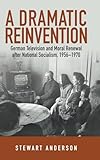A Dramatic Reinvention : German Television and Moral Renewal after National Socialism, 1956–1970 / Stewart Anderson.
Material type: TextPublisher: New York ; Oxford : Berghahn Books, [2020]Copyright date: ©2020Description: 1 online resource (224 p.)Content type:
TextPublisher: New York ; Oxford : Berghahn Books, [2020]Copyright date: ©2020Description: 1 online resource (224 p.)Content type: - 9781789206449
- 9781789206456
- Television broadcasting -- Moral and ethical aspects -- Germany
- Television broadcasting -- Social aspects -- Germany
- Television broadcasting -- Germany -- History -- 20th century
- Television programs -- Germany -- History -- 20th century
- Variety shows (Television programs) -- Germany -- History -- 20th century
- HISTORY / Europe / Germany
- History: 20th Century to Present, Film and Television Studies, Media Studies
- 791.450943/09045 23
- online - DeGruyter
| Item type | Current library | Call number | URL | Status | Notes | Barcode | |
|---|---|---|---|---|---|---|---|
 eBook
eBook
|
Biblioteca "Angelicum" Pont. Univ. S.Tommaso d'Aquino Nuvola online | online - DeGruyter (Browse shelf(Opens below)) | Online access | Not for loan (Accesso limitato) | Accesso per gli utenti autorizzati / Access for authorized users | (dgr)9781789206456 |
Frontmatter -- Contents -- Acknowledgments -- Abbreviations -- Introduction -- Chapter 1 Navigating History: Historical Consciousness, International Cooperation, and Redemption -- Chapter 2 Crafting Political Role Models: The Righteous Fugitive and the Man (or Woman) of Conscience -- Chapter 3 Managing Prosperity: Moderation, Empathy, and Christianity -- Chapter 4 Resetting Gender Roles: Women’s Equality, Reinvented Masculinity, and the Nuclear Family -- Chapter 5 Embracing Diversity Racial Tolerance and Integration -- Conclusion -- Epilogue -- Appendix 1 Television Programs Referenced -- Appendix 2 West German Television Stations -- Appendix 3 Television Licenses/Subscriptions, 1958–1970 -- Bibliography -- Index
restricted access online access with authorization star
http://purl.org/coar/access_right/c_16ec
Following World War II, Germany was faced not only with the practical tasks of reconstruction and denazification, but also with the longer-term mission of morally “re-civilizing” its citizens—a goal that persisted through the nation’s 1949 split. One of the most important mediums for effecting reeducation was television, whose strengths were particularly evident in the thousands of television plays that were broadcast in both Germanys in the 1950s and 1960s. This book shows how TV dramas transcended state boundaries and—notwithstanding the ideological differences between East and West—addressed shared issues and themes, helping to ease viewers into confronting uncomfortable moral topics.
Mode of access: Internet via World Wide Web.
In English.
Description based on online resource; title from PDF title page (publisher's Web site, viewed 25. Jun 2024)


